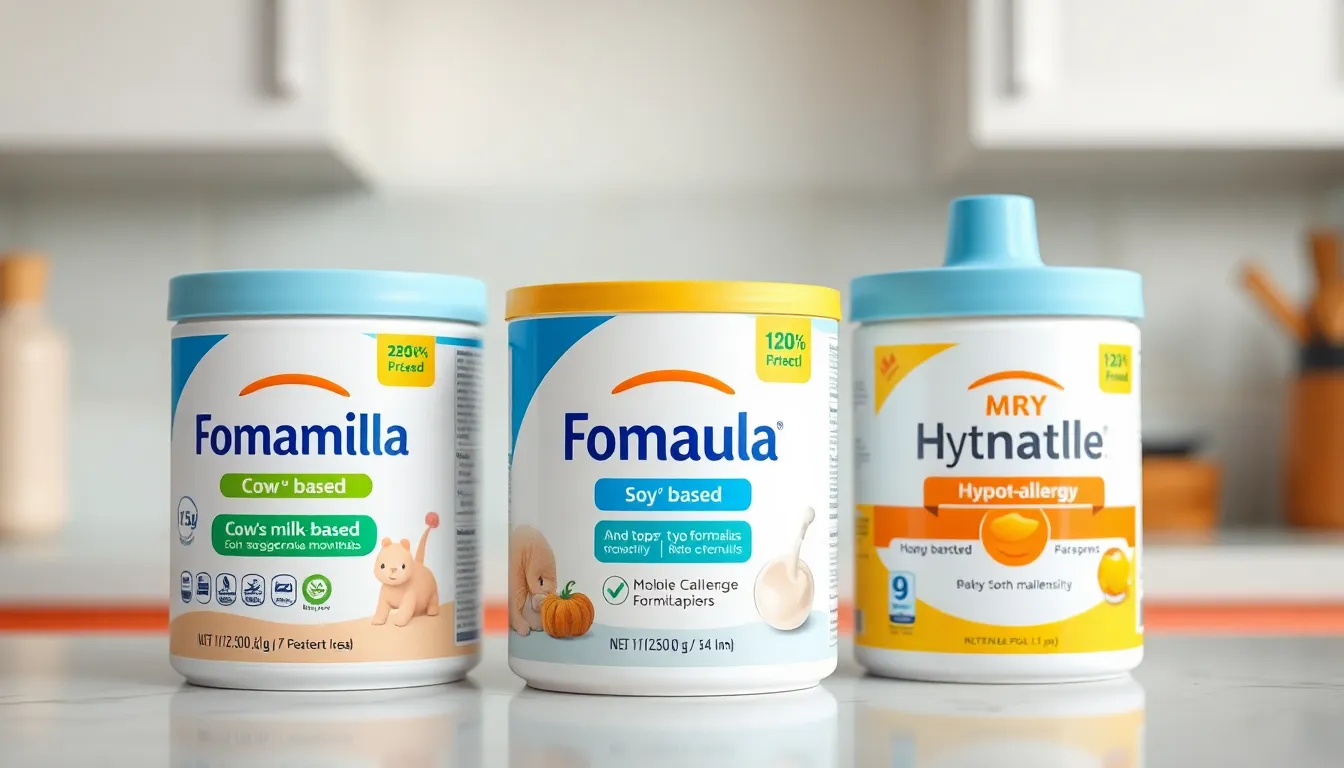Table of Contents
ToggleChoosing the best baby formula for newborns can feel like navigating a minefield of options. With so many choices out there, it’s easy to get overwhelmed. After all, every parent wants to ensure their little one gets the best start in life, and that includes nutrition. But fear not! This guide will help parents sift through the sea of formulas to find the perfect match for their tiny human.
Best Baby Formula for Newborns
Choosing the best baby formula for newborns involves understanding specific nutritional needs. Parents often consider several factors, including ingredients, digestibility, and potential allergens.
Similac Pro-Advance stands out for its blend of DHA, lutein, and vitamin E. This formula supports brain development and offers a blend similar to breast milk, making it a popular choice.
Enfamil NeuroPro is another excellent option, providing nutrients for cognitive development. Its MFGM component mirrors the beneficial fats found in breast milk, promoting healthy brain functioning.
Gerber Good Start Gentle excels in gentle digestion, thanks to its probiotic support. This formula contains 100% whey protein, easing the transition for babies with sensitive tummies.
Earth’s Best Organic Dairy appeals to parents looking for organic options. Made with wholesome ingredients, this formula prioritizes nutrition without harmful pesticides or artificial fertilizers.
Happy Baby Organic is a noteworthy choice as well. It features organic ingredients and is designed to support a baby’s developing immune system.
Understanding each formula’s strengths allows for a more tailored selection based on individual needs. Reading reviews and consulting with pediatricians can aid in making the right decision.
Types of Baby Formula

Selecting the right baby formula includes understanding the different types available. Each formula type caters to specific nutritional needs.
Cow’s Milk-Based Formula
Cow’s milk-based formula typically serves as the primary choice for parents. Most infants tolerate this formula well, as it contains essential nutrients for growth. Brands like Similac Pro-Advance and Enfamil NeuroPro offer formulations rich in DHA and other vital ingredients. These nutrients support cognitive development and overall health. While this formula is widely accepted, infants with dairy allergies may require alternatives.
Soy-Based Formula
Soy-based formula presents a suitable option for infants with lactose intolerance or milk allergies. This formula uses soy proteins to deliver nutrition equivalent to cow’s milk-based options. Brands such as Enfamil Soy and Similac Soy Isomil provide vital nutrients for healthy growth. Many parents appreciate the plant-based ingredient, which can be easier to digest for sensitive stomachs. Consulting a pediatrician ensures its suitability for specific dietary needs.
Hypoallergenic Formula
Hypoallergenic formula targets infants with allergies or sensitivities to proteins in regular formulas. These formulas use extensively hydrolyzed or amino acid-based proteins for easier digestion. Brands like Nutramigen and Alimentum are common choices among parents seeking this option. The reduced allergenic potential helps minimize adverse reactions such as gas or fussiness. Choosing hypoallergenic formula often requires pediatric guidance to ensure proper nutritional support.
Key Nutritional Factors
Understanding key nutritional factors is crucial for choosing the best baby formula. Parents aim to provide complete nutrition that supports their newborn’s growth and development.
Essential Vitamins and Minerals
Infant formulas include various essential vitamins and minerals. Vitamin D, calcium, and iron are particularly important. Vitamin D ensures proper bone development, while calcium strengthens bones and teeth. Iron, crucial for cognitive development, prevents anemia. Many top formulas contain DHA and ARA, fatty acids vital for brain and eye development. Parents should check labels to confirm vitamin and mineral content matches recommendations from pediatricians.
Protein Content
Protein content significantly influences infant growth. Most formulas use whey and casein, proteins derived from cow’s milk. These proteins are digestible for infants and support muscle growth. Some formulas offer hydrolyzed proteins for sensitive infants. Hydrolyzed options are broken down into smaller peptides, reducing potential allergic reactions. It’s important to choose a protein source that aligns with the newborn’s digestion and nutritional needs.
Carbohydrate Sources
Carbohydrates provide the primary energy source for infants. Most formulas use lactose, a sugar found in breast milk. Lactose offers beneficial effects, such as aiding calcium absorption. Some formulas utilize maltodextrin or corn syrup solids for infants with lactose intolerance. These alternatives are easy to digest and provide energy. Parents should select carbohydrate sources that support both energy levels and digestive health in their newborns.
Top Brands Reviewed
Several reputable brands stand out in the market for baby formula. Each brand offers unique features catering to various nutritional needs of newborns.
Brand A Overview
Similac Pro-Advance delivers nutrients essential for brain development. It contains OptiGRO, a unique blend of DHA, lutein, and vitamin E. The formula supports immune health by including nucleotides, which are vital for growth. Parents appreciate its cow’s milk base, making it suitable for most infants. Additionally, many find it easy to digest, reducing the likelihood of gastrointestinal discomfort. Similac Pro-Advance stands out for its focus on optimal cognitive development.
Brand B Overview
Enfamil NeuroPro is known for its focus on cognitive development. This formula features MFGM, a fat-protein blend that mimics breast milk. With its blend of omega 3 DHA and choline, it aids brain growth and function. Many parents choose Enfamil NeuroPro for its easy mixability and smooth texture. The formula is designed to support visual and cognitive development in infants. Reviewers often highlight its overall nutrition profile, addressing growth needs effectively.
Brand C Overview
Gerber Good Start Gentle is tailored for sensitive tummies. It uses a blend of comfort proteins that enhance digestibility. Infants often thrive on this gentle formula, reducing fussiness and discomfort. The addition of prebiotics encourages healthy gut bacteria, promoting digestive health. This brand maintains a commitment to high-quality ingredients, ensuring safety and nutritional integrity. Many parents report satisfaction with its impact on their baby’s overall well-being and comfort.
Choosing the Right Formula
Selecting the right baby formula involves careful consideration, especially regarding allergies and professional guidance.
Considerations for Allergies
Allergies in newborns can affect formula choice significantly. Cow’s milk protein allergy impacts about 2 to 3 percent of infants, leading to reactions that require switching to hypoallergenic options like Nutramigen or Alimentum. Symptoms may include rash, vomiting, or digestive issues. Soy-based formulas serve as alternatives for some infants with lactose intolerance or milk allergies. Families should monitor their baby’s reactions closely after switching formulas. Understanding these considerations helps parents make informed decisions tailored to their child’s needs.
Consulting with Pediatricians
Consulting with pediatricians plays a crucial role in formula selection. Pediatricians can assess individual nutritional needs and recommend the most appropriate formulas for infants. Frequent discussions help address concerns regarding allergies, intolerances, and developmental milestones. Pediatricians also provide valuable insight into the types of formulas available, ensuring parents choose the best one for their child’s health. Since each baby is unique, establishing this relationship can lead to ongoing support and guidance throughout a child’s early nutrition journey.
Selecting the right baby formula for newborns is a significant decision for parents. With various options available it’s essential to consider each infant’s unique nutritional needs. Understanding the differences between cow’s milk-based soy-based and hypoallergenic formulas helps parents make informed choices.
By focusing on key nutritional factors like protein content vitamins and minerals parents can ensure their babies receive optimal support for growth and development. Consulting with pediatricians provides valuable guidance tailored to individual circumstances. Ultimately the right formula can contribute to a healthy start for every newborn.





